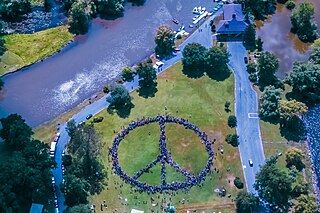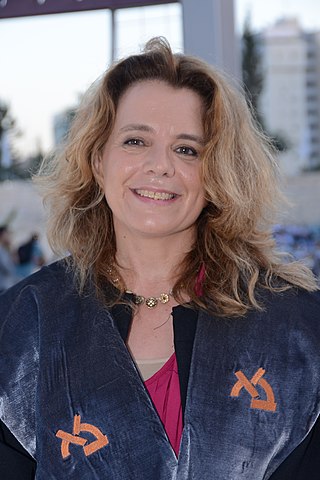Related Research Articles
Transformative justice is a spectrum of social, economic, legal, and political practices and philosophies that aim to focus on the structures and underlying conditions that perpetuate harm and injustice. Taking up and expanding on the goals of restorative justice such as individual/community accountability, reparation, and non-retributive responses to harm, transformative justice imagines and puts into practice alternatives to the formal, state-based criminal justice system.

Restorative justice is an approach to justice that aims to repair the harm done to victims. In doing so, practitioners work to ensure that offenders take responsibility for their actions, to understand the harm they have caused, to give them an opportunity to redeem themselves, and to discourage them from causing further harm. For victims, the goal is to give them an active role in the process, and to reduce feelings of anxiety and powerlessness. Restorative justice programs can also complement traditional methods, such as retributive justice, and it has been argued that some cases of restorative justice constitute punishment from the perspectives of some positions on what punishment is.
John Paul Lederach is an American Professor of International Peacebuilding at the University of Notre Dame, Indiana, and concurrently Distinguished Scholar at Eastern Mennonite University. He has written widely on conflict resolution and mediation. He holds a Ph.D. in Sociology from the University of Colorado. In 1994 he became the founding director for the Center for Justice and Peacebuilding at Eastern Mennonite University where he was a professor. He currently works for the foundation Humanity United.

A truth commission, also known as a truth and reconciliation commission or truth and justice commission, is an official body tasked with discovering and revealing past wrongdoing by a government, in the hope of resolving conflict left over from the past. Truth commissions are, under various names, occasionally set up by states emerging from periods of internal unrest, civil war, or dictatorship marked by human rights abuses. In both their truth-seeking and reconciling functions, truth commissions have political implications: they "constantly make choices when they define such basic objectives as truth, reconciliation, justice, memory, reparation, and recognition, and decide how these objectives should be met and whose needs should be served".
Peace education is the process of acquiring values, knowledge, attitudes, skills, and behaviors to live in harmony with oneself, others, and the natural environment.
Peace journalism is a style and theory of reporting that aims to treat stories about war and conflict with balance, in contrast to war journalism, which peace journalism advocates say display a bias toward violence. The theory proposes practical methods for correcting biases in stories appearing in the mainstream and alternative media, and suggests ways for journalists to work with other media professionals, audiences, and organizations in conflict.
Transitional justice is a process which responds to human rights violations through judicial redress, political reforms and cultural healing efforts in a region or country, and other measures in order to prevent the recurrence of human rights abuse. Transitional justice consists of judicial and non-judicial measures implemented in order to redress legacies of human rights abuses. Such mechanisms "include criminal prosecutions, truth commissions, reparations programs, and various kinds of institutional reforms" as well as memorials, apologies, and various art forms. Transitional justice is instituted at a point of political transition classically from war to positive peace, or more broadly from violence and repression to societal stability and it is informed by a society's desire to rebuild social trust, reestablish what is right from what is wrong, repair a fractured justice system, and build a democratic system of governance. Given different contexts and implementation the ability to achieve these outcomes varies. The core value of transitional justice is the very notion of justice—which does not necessarily mean criminal justice. This notion and the political transformation, such as regime change or transition from conflict are thus linked to a more peaceful, certain, and democratic future.

Peacebuilding is an activity that aims to resolve injustice in nonviolent ways and to transform the cultural and structural conditions that generate deadly or destructive conflict. It revolves around developing constructive personal, group, and political relationships across ethnic, religious, class, national, and racial boundaries. The process includes violence prevention; conflict management, resolution, or transformation; and post-conflict reconciliation or trauma healing before, during, and after any given case of violence.

Daniel Bar-Tal is an Israeli academic, author and professor of social-political psychology from the Department of Education at Tel Aviv University. He is also the head of the Walter-Lebach Institute for Jewish-Arab Coexistence. His research deals with the study of conflicts and their resolution, especially in the Israeli-Arab context.
Center for Justice and Peacebuilding (CJP) is an accredited graduate-level program founded in 1994. It also offers non-credit training. The program specializes in conflict transformation, restorative justice, trauma healing, equitable development, and addressing organizational conflict. CJP is housed at Eastern Mennonite University (EMU) in Harrisonburg, Virginia, which describes itself as "a leader among faith-based universities" in emphasizing "peacebuilding, creation care, experiential learning, and cross-cultural engagement." One of the three 2011 Nobel Peace Laureates, Leymah Gbowee of Liberia, earned a master's degree in conflict transformation from CJP in 2007.
Victim mentality is a psychological concept referring to a mindset in which a person, or group of people, tends to recognize or consider themselves a victim of the actions of others. The term is also used in reference to the tendency for blaming one's misfortunes on somebody else's misdeeds, which is also referred to as victimism. It can develop as a defense mechanism to cope with negative life events.
Peace psychology is a subfield of psychology and peace research that deals with the psychological aspects of peace, conflict, violence, and war. Peace psychology can be characterized by four interconnected pillars: (1) research, (2) education, (3) practice, and (4) advocacy. The first pillar, research, is documented most extensively in this article.

Hizkias Assefa is a conflict mediator known widely in Africa for his non-aligned work as a consultant who has mediated in most major conflict situations in sub-Saharan Africa in the past 20 years, as well as in a dozen countries elsewhere. He is also a professor of conflict studies. Of Ethiopian origin, he is based in Nairobi, Kenya. He was one of the founding faculty members in 1994 of the Conflict Transformation Program at Eastern Mennonite University.
Tecla Namachanja Wanjala is a conflict resolution, post-conflict rehabilitation, and development worker from Kenya. She was the Acting Chair of The Truth, Justice and Reconciliation Commission of Kenya. She has five children
Martin Leiner is a German Protestant theologian and a professor for applied ethics. He holds a chair in Systematic Theology/Ethics at the Faculty of Theology at Friedrich-Schiller-Universität (FSU) Jena, Germany. He is the founder and director of the Jena Center for Reconciliation Studies (JCRS). He was president of the International Association for Reconciliation Studies (IARS) from 2020 to 2024.
Intergroup dialogue is a "face-to-face facilitated conversation between members of two or more social identity groups that strives to create new levels of understanding, relating, and action". This process promotes conversation around controversial issues, specifically, in order to generate new "collective visions" that uphold the dignity of all people. Intergroup dialogue is based in the philosophies of the democratic and popular education movements. It is commonly used on college campuses, but may assume different namesakes in other settings.
The Sierra Leone's Truth and Reconciliation Commission was a truth commission created as part of the Lomé Peace Accord, which ended the 11-year civil war conflict in Sierra Leone in July 1999.
Nadim Rouhana is Professor of International Affairs and Conflict Studies and the Issam M. Fares Chair in Eastern Mediterranean Studies at The Fletcher School. Before joining the Fletcher School in 2008, Rouhana held teaching positions at Israeli, Palestinian, and American universities including Harvard University, Tel Aviv University and George Mason University. His research is published in Arabic, Hebrew, and English. Rouhana’s research has been supported by numerous foundations, including The Ford Foundation, MacArthur Foundation, The Luce Foundation, and the United States Institute for Peace. Rouhana is also the Founding Director of Mada al-Carmel—The Arab Center for Applied Social Research in Haifa, which undertakes theoretical and applied social research and policy analysis to broaden knowledge and critical thinking about the Palestinians in Israel, equal citizenship, and democracy. Mada’s research focuses on Israeli society, Palestinian society, dynamics of conflict, settler societies and decolonization, collective rights, and alternatives to partition. While at Mada, he led a process that brought together about fifty political, academic, and civil society leaders from the Palestinian citizens in Israel that deliberated for more than one year on a vision document to define the relationship between Israel and its Palestinian citizens. The documented, The Haifa Declaration, was endorsed by hundreds of community leaders.

Michal Alberstein is an expert in the field of conflict resolution and reconstruction of legal thought. Alberstein is the Dean of The Faculty of Law, Bar-Ilan University, the Primary Investigator on an ERC consolidator grant to study Judicial Conflict Resolution (JCR) and the academic chairperson of “Israeli hope” project, supported by the president of Israel and High Council of Education.
Since about the 2010s, reconciliation studies has been a new scientific approach in the field of peace and conflict studies. It has commonalities with peacebuilding, conflict transformation, and transitional justice research, and to a lesser extend with academic work on peace psychology, conflict resolution, conflict management, mediation, security studies, memory studies, and trauma and resilience studies.
References
- ↑ Website of Jena Center for Reconciliation Studies. https://www.jcrs.uni-jena.de/154/what-is-reconciliation-about (text by Martin Leiner)
- ↑ Lederach, J. P. (1997). Building peace: Sustainable reconciliation in divided societies. United States Institute of Peace Press
- ↑ Korostelina, K.V. (2018). Reconciliation in Ukraine: within and across the boundary. In Gardner L. (ed). Societies in Transition. The Former Soviet Union and East Central Europe between Conflict and Reconciliation, Vandenhoeck & Ruprecht, pp.105-130
- ↑ Website of JCRS. https://www.jcrs.uni-jena.de/154/what-is-reconciliation-about (text by Martin Leiner)
- ↑ Charles Villa-Vicencio. (1998). A Different Kind of Justice: The South African Truth and Reconciliation Commission, Contemporary Justice Review 1, pp.407-428.
- ↑ He, Y. (2011). Comparing Post-War (West) German–Polish and Sino-Japanese Reconciliation: A Bridge Too Far? Europe-Asia Studies, 63(7), pp.1157–1194. https://doi.org/10.1080/09668136.2011.592266
- ↑ Bloomfield, D., Barnes, T., Huyse, L., & International Institute for Democracy and Electoral Assistance (Eds.). (2003). Reconciliation after violent conflict: A handbook. International IDEA.
- ↑ Korostelina, K.V. (2024) The Bridge Model: the role of Identity in Peace processes. In Korostelina, K.V., Gopin M., Helsing J., and A. Ozerdem (Editors). Identity and Religion in Peace Processes: Mechanisms, Strategies, and Tactics. Routledge, p.18
- ↑ Kelly Mckone. (2015). Reconciliation in Practice. United States Institute of Peace.